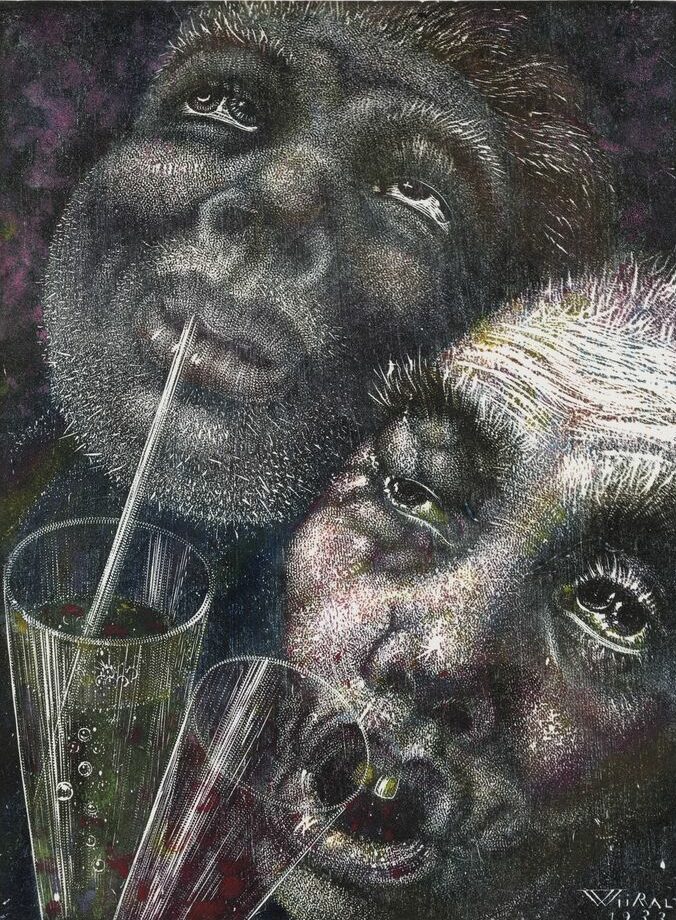Dear readers,
EstLit. Estonian Literature is a new English-language magazine dedicated to showcasing Estonian literature.
The magazine is published by ELIC, the Estonian Literature Centre (estlit.ee).
The online edition is updated regularly throughout the year, while the print issue is published annually in the autumn.
The spring online issue opens with a selection of more or less experimental and transgressive texts, which, in some ways, echo the spirit of surrealism that celebrated its centenary last year. In compiling this selection, I had in mind the project of the anthology of dark humour by the father of French surrealism, André Breton. Perhaps we could think of this selection as a sampler for a potential anthology of Estonian literature’s dark and psychedelic humour.
Why dark and psychedelic? I added the latter adjective to somewhat expand the inherent ambivalence already present in the notion of dark humour. In this context, psychedelic is meant in its original sense – mind-expanding – while also resonating, to some extent, with the broader psychedelic renaissance that has recently gained traction in scientific and cultural spheres.
From my editorial perspective, this kind of psychedelia is something inherently tied to good experimental and/or surrealist literature. Such writing, on the one hand, grants access to the hidden ocean of the unconscious, while on the other, it significantly expands the boundaries of the reading subject. This so-called psychedelic literature is, to paraphrase Andres Ehin – the Estonian surrealist classic featured in this issue – a door onto a clearing.
And of course, one might recall how our Baltic colleague Saulius Tomas Kondrotas has described the act of writing itself: ‘Writing is fun. Not quite unlike psychedelics. When you write, you leave your body in this world with the task of recording your adventures in another realm.’
In addition to showcasing works that lean towards a more transgressive aesthetic, we also highlight texts with a more traditional approach – though always with a focus on the highest calibre of writing, works that, in both content and expression, have the potential to resonate with the widest possible audience. After all, we believe that even what may at first seem niche or exotically experimental can, in principle, speak to anyone with a broad and open literary sensibility.
By submerging ourselves, one way or another, in the deeper realms of both authors’ and readers’ inner worlds, we aim to feature a diverse range of voices, including those that articulate perspectives deviating from the norm. In a sense, one could say that this was also André Breton’s endeavour when compiling his Anthology of Dark Humour. In the spirit of the father of surrealism, we might say that our goal is to bring to light that which is brilliant and exceptional in life and literature – seeking distance from the banal, the conventional, and the dull. We hope that some magical spark, étincelle, shimmers through every text published in EstLit.
We also wish to convey a clear ideological message that opposes, whether explicitly or implicitly, all forms of dictatorial, repressive, and oppressive political tendencies, both in the East and the West. Transgression and madness, which we embrace, aim to expand poetic freedom, not to stifle it.
We publish poetry, fiction, conversations, book reviews, and essays. While we aim to capture what is most vital in Estonian literature today, we also wish to unearth gems from the 20th century that deserve renewed attention.
Enjoy the lunacy, avoid the mundane!
Kristjan Haljak
Editor of the magazine EstLit. Estonian Literature

About the editor
Kristjan Haljak (b. 1990) is an Estonian poet and translator. Known for his surrealist and transgressive style, Haljak’s work moves between narrative impulse and hypnotic sound play. His debut collection Palavik (Fever, 2014) announced a distinctive voice in Estonian poetry, further developed in books such as Conceptio Iimmaculata (2017), Uus inimene (New Man, 2017), Verlaine’i revolver (2018), and most recently Elektra Domina (2023), where themes of mysticism, eroticism, and literary revolt converge.
He has translated key works of French modernism and surrealism into Estonian, including writings by Charles Baudelaire, André Breton, and Comte de Lautréamont. His doctoral dissertation, Jaan Oks and Lautréamont: dark-transgressive literature and the revolution in poetic language (2025), explores the psychopoetic extremes of two visionary writers.
Haljak has been a member of the Estonian Writers’ Union since 2017. He is the recipient of several literary honours, among them the Looming Prize (2022) and the Tallinn University Literary Award (2018, 2024).
In This Issue
Poetry
‘time to appear yo the hour is super nigh’ by Sveta Grigorjeva
Sussurus and Other Poems by Triin Paja
‘My Poor Love’ and ‘The Garden Bed’ by Gregor Kulla
dr lu-ming and fate and Other Poems by Andres Ehin
‘Live Freely or Die’ and ‘The End of the Anchor Chain’ by Ilmar Laaban
My Body is the Dream of my Ancestors and Other Poems by Hasso Krull
The Race and Other Poems by Maarja Pärtna
When a Human Being Dies and Other Poems by fs
Fiction
‘The Mouth’ and ‘The Mountain of Souls’ by Jaan Oks
Excerpts from The Night of Souls by Karl Ristikivi
Excerpts from The Autumn Ball by Mati Unt
‘Glass Noodles’ by Maarja Kangro
‘The Manifesto of Clotted Blood’
‘Vita Nova’ by Kristjan Haljak
Perspectives
‘Echoes of the North and Estonia’s Quest for Mythic Nordicness’ by Mart Kuldkepp
Rainer Sarnet’s Diary of Vaino Vahing
Reviews
Meelis Friedenthal’s Around a Point
Vahur Laiapea’s Diaries From Ukraine
